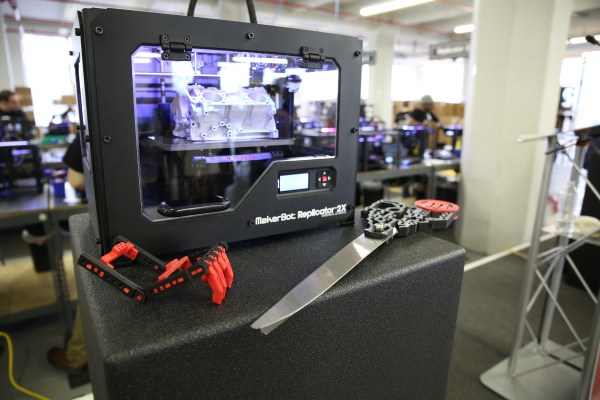Today Stratasys announced that it has acquired MakerBot, as we first reported, in a stock deal worth $403 million based on the current share value of Stratasys. The combination of the companies brings together a leader in 3D industrial printing and manufacturing, with the emerging leader in desktop 3D printing, which the companies said in a press release should help drive “faster adoption of 3D printing” across all categories.
MakerBot will continue to operate as a separate company from Stratasys as part of the deal, which is reportedly stock-for-stock transaction. It’ll be a subsidiary of Stratasys, but will serve the consumer and desktop market segment while Stratasys continues to focus on its existing industry placement.
MakerBot was founded in 2009, and has since sold over 22,000 3D printers, with its most recent model making up 11,000 of those sales coming from the Replicator 2, which it launched back in September 2012. That means traction is on the upswing in a big way, something which no doubt helped pave the way for the deal.
As for Stratasys, its name might be less familiar for regular TechCrunch readers, though it may ring a bell from when we accurately reported that acquisition talks between the two companies were ongoing earlier this month. But in terms of the history of 3D printing it’s operating in much more established space. It facilitates the printing of prototypes, concepts, components, parts and more on an industrial scale and for commercial applications. The publicly traded company merged with Object Ltd in 2012 to form one large entity, and is headquartered in both Minneapolis and Rehovot, Israel.
Stratasys has demonstrated it’s going to be aggressive about owning the 3D printing space, and the MakerBot buy is the consumer-focused piece in that puzzle. For MakerBot, it gives the startup access to Stratasys’ wealth of industry experience, as well as probably better access to new tech coming down the pipeline, a greater pool of engineering talent and more resources to put behind marketing and distribution.
MakerBot has been pretty consistent in terms of updating its hardware and software since the startup got off the ground four years ago, and released updated firmware and design software just last week to improve the quality of its printed products. The company has some competition from other, newer startups like Form Labs, whose Form 1 3D printer John recently tested out, but MakerBot already had a head start on the younger company, and Stratasys should be able to juice its growth even further.
